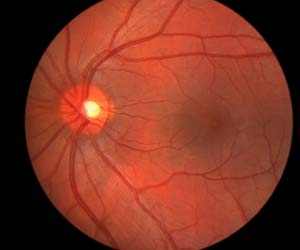New targeted treatment for diabetic retinopathy has been uncovered. Increased levels of endogenous protein namely Retinol Binding Protein 3 (RBP3) present in the eye may be able to reverse early diabetic retinopathy and prevent progression and blindness.
Highlights:
- High levels of endogenous protein namely Retinol Binding Protein 3 (RBP3) occurring in the eye may be able to prevent progression or even reverse early diabetic retinopathy and prevent progression of the condition
- If the findings of the current study become applicable in clinical practice, it could help preserve the sight of several thousand patients diagnosed with diabetic retinopathy
- Currently, available treatments include either laser photocoagulation or anti-VEGF injections to treat advanced diabetic retinopathy
Read More..
Why Some Patients with Longterm Diabetes Don’t Develop Retinopathy?
Although diabetic eye complications are seen in most patients with longstanding diabetes, about 35% of patients don’t develop eye complications despite having elevated glucose levels.Dr. King, senior author and his team hypothesized that these patients might have some endogenous or naturally occurring substance protecting them from the harmful effects of high glucose levels. This new study built on this hypothesis aimed to determine possibly what naturally occurring substance could be protecting the eye.
To test their hypothesis, the team of scientists studied patients who were part of the Medalist group of the Joslin Diabetes Center’s50-Year Medal Program that recognizes and honors patients who have lived with insulin-dependent diabetes for over 50 years for their successful diabetic management.
Details of the Study
- The team obtained samples from the eyes of patients both from living patients undergoing surgery and from people who had donated their eyes after death
- The study team analyzed several proteins that were present, to identify whether any specific protein occurred in higher amounts in the eyes of patients who did not develop retinopathy
- They found that RBP3, a protein normally occurring in the retina of the eye was increased
- To check whether this was the protective agent, the team designed experiments to compare the effects of normal against the increased expression of RBP3 in mouse models
- They found mice having overexpression of RBP3 were protected from developing diabetic retinopathy
- Next, the scientists injected pure RBP3 into the vitreous of the eyes of mice having early stages of retinopathy and found that injection of this protein reversed some of the early damage caused by diabetic retinopathy
- They also demonstrated that many diabetes patients appear to have reduced expression of RBP3 which explains why only some patients with diabetes are protected from eye disease
Developing Targeted Therapy for Early Diabetic Retinopathy
Retinol Binding Protein 3 is found in everyone’s eyes and is necessary to regenerate a specific form of vitamin A in the eye that is necessary for normal activity of sight-giving rods and cones. However, when RBP3 is exposed to high glucose levels, it plays a protective role by preventing the entry of glucose into the retinal cells by blocking the action of glucose transporter, GLUT-1.A better understanding of the mechanisms by which this occurs may allow scientists to develop a targeted treatment to treat early diabetic retinopathy".
"We are interested in how we can treat diabetic eye disease at its earliest stages before it gets to the severe forms," says Dr. King.
Scope of the Study and Future Plans
- During the study, the scientists discovered that although RBP3 mainly occurs in the eye, it is also detected to a small extent in the blood. Dr. King and his team plan to conduct further research to determine if RBP3 levels in the blood have any relationship to risk of developing diabetic retinopathy
- If a correlation is found, RBP3 could be used as a potential biomarker that physicians who are not familiar with retinal examination can routinely use in clinical practice to screen for diabetic retinopathy
- As such it would be possible to diagnose the condition early by a blood test and manage accordingly
References:
- Joslin researchers uncover protective factor in diabetic eye disease - (https://www.joslin.org/news/RBP3-protective-factor-in-diabetic-retinopathy.html)
Source-Medindia















